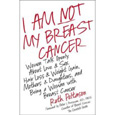I Am Not My Breast Cancer: Women talk openly about love & sex, hair loss & weight gain, mothers & daughters, and being a woman with Breast Cancer
| |||||||||||||||||||||||
I confess that I have a real weakness for books like these - books whose pages echo with the authentic voices of real women identified only by anonymous screen names like BCWarrior and Princess86. Women who speak honestly about the Breast Cancer experience, whose words sometimes feel less like email messages and more like poems, as in the case of this entry by JodieR from the Being Womanly chapter:
I am woman. I am sexy. I am boobless. I look a little sick. I am proud. I am scarred. I am good. I am afraid. I am warm. I am still alive. I have bad feelings. I am smart. I know real pain. I am artistic. I deal with lymphedema. I have good feelings. I have blue eyes. I have cancer. I am still alive. You hear me out there? I am alive.
Breast Cancer survivor and author Ruth Peltason wanted to create a book by survivors, for survivors that would be a "warts-and-all, tell-all," not the usual "saccharine or superficial" approach to the breast cancer experience. She has absolutely, positively succeeded.
I Am Not My Breast Cancer is well organized into three parts: "diagnosis", "living with breast cancer", and "the big picture". Each of these sections is filled with short paragraphs that reveal the women’s stories one after another – dealing with hair loss, telling your children about the diagnosis, facing the mirror after surgery, balancing treatment with work. The contributors come to life as their stories grow, one entry after another, chapter by chapter throughout the book.
Peltason gathered the information by hosting a First Person Plural website, inviting survivors all over the world to contribute their cancer survivor experiences. Her author's challenge was to edit input from over eight hundred women, ranging in age from 20 to 70 years old.
Along the way, the women share their insights ("when breast cancer hits you, you have to do what’s best for you; you become Number 1,") and CancerLand lessons learned ("it is ironic that something which left me so disfigured on the outside has left me so whole on the inside"). They describe their hopes ("I want to look and feel normal again…I do not want to wear my disease like a battle scar for all to see,") and reveal deep hurts ("..a very dear friend told me that if I had to get cancer that at least I was lucky and got breast cancer.") The fact that no real contributor names are included might have something to do with the ladies’ openness and uninhibited comments, especially in the section on Love Relationships and Sexual Intimacy. No other book in my collection deals as honestly with this very important issue.
Comparisons can be made to another book in print that is also filled with breast cancer survivor tips: Uplift by Barbara Delinsky. There are real stylistic differences between the two, most notably Delinsky’s avoidance of anything that isn’t 100% upbeat, perky and positive. Peltason’s contributors reveal far more, including righteous anger and feelings of loss. And as any cancer survivor will tell you in a heartbeat, that’s part of the journey too.


